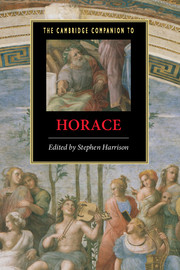8 - The Satires
from Part 2: - Poetic Genres
Published online by Cambridge University Press: 28 May 2007
Summary
Magnam rem puta unum hominem agere. Praeter sapientem autem nemo unum agit, ceteri multiformes sumus.
Consider it a great thing to play the role of one man. But nobody except the wise man plays a single role; the rest of us have many parts.
(Seneca, Epistles to Lucilius 120.22)The first monograph in English devoted exclusively to the Satires appeared as recently as 1966. On reflection, it is perhaps not surprising that this was presented as 'an effort to revive interest in Horace’s Satires'. Much to the taste of the eighteenth century, the Satires had inevitably been swept aside in the age of Romanticism. Even in the mid-twentieth century, under the lingering influence upon later criticism of the Romantic interest in individuality, Eduard Fraenkel’s powerful voice had dismissed a considerable proportion of the two books as immature and ineffective Lucilian experiments, and Patrick Wilkinson (in a book on Horace’s lyric poetry written for non-specialists) had felt obliged to explain why he did not get much enjoyment from the hexameter works.
In the generation or two that have now passed since Rudd brought the Satires back into the mainstream of Latin literary studies, there have been enormous changes in this field, and, far from being neglected, the Satires have been recognised as offering much scope to current interpretive approaches, where emphasis is placed on dynamic relationships within genre and literary history, on the ideological dimension and on reintegration of the cultural and the political.
- Type
- Chapter
- Information
- The Cambridge Companion to Horace , pp. 105 - 120Publisher: Cambridge University PressPrint publication year: 2007
- 8
- Cited by

